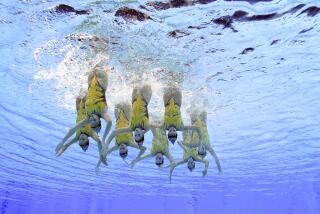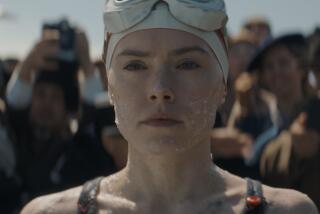These Women Find Success Is a Breeze : Sailing: Tracy Edwards and her all-female crew are overcoming stereotypes and impressing competitors in race around the world.
- Share via
FT. LAUDERDALE, Fla. — When Tracy Edwards of England rounded up 11 friends to sail in a race around the world, some in the yacht set nudged one another and made jokes about Gidget Goes to Sea.
They wished her luck, waved her off--and put the Coast Guard on alert.
When she drove her 58-foot sailboat Maiden toward the icebergs, gales, four-story seas and other horrors of the Southern Ocean, they paled: This had gone far enough.
Not quite. She and her crew had thousands of miles to go before they rested. On Sept. 2 at Portsmith, England, they began sailing in this Whitbread Round the World race. The competition is divided into four divisions, determined by boat size. Never before had there been an all-female crew.
More than the ocean, Edwards feared failure, so she kept sailing, withstanding stereotypes as well as the sea.
“You’re brought up from when you’re that high,” Edwards said, reaching toward the deck, “that women can’t do certain things that guys can.”
But, she said, English women are a lot like American women: “When we decide to do something, we just go do it.
“Now that we’ve done it, they’re all (saying), ‘Brilliant . . . well done.’ They’re surprised and pleased.”
Edwards has a confession to make. She wasn’t sure they could do it, either.
“Even though we said, ‘Oh yes, we can do it,’ we were a bit nervous because we didn’t know what to expect.
“This race has been an education for all 12 women on Maiden. It was a total experiment . . . never been done before. People weren’t aggressively opposed to us doing it. They just didn’t think we could.”
So 29,095 nautical miles later, with only 3,837 to go, the yachting world is impressed. So is Edwards.
“I think I’ve got the best crew in the race,” she said. “We’re the only crew apart from (first-place) Steinlager that hasn’t changed on the way around.”
By the time they’re done, that will be about nine months in the same boat.
“We’d been told time and again we wouldn’t get on, (that) we were gonna argue and be unhappy, so there was a bit of trepidation,” said Edwards, who sold her house to buy the boat.
“But it’s been unbelievable. They’re all very special ladies or they wouldn’t be there, and there were about 200 other applicants that could have easily gone with us.”
Edwards had no trouble collecting a crew. She received 460 applications and interviewed more than 100 candidates.
“They were picked on an instinctive liking--not just me for them but them for me, as well,” she said. “They have to trust me a lot to let me take them around the world, when everyone was telling me it wasn’t possible.
“If they walked into my office and we both clicked, they’re on the boat now.”
Edwards replaced the original first mate when it appeared she wouldn’t work out. The other 10 selections remained. They represent seven nationalities. Three are married.
One--Dawn Riley, 25, of Detroit--is an American. A former captain of the Michigan State sailing team, she signed up when she found herself “between jobs.”
Edwards will write a book that has its own stereotypes.
“The thing we have learned is that women are a lot more adaptable than men,” she said. “I’ve done the race with 17 guys on a maxi, and I’ve done the race with 11 women, so it’s very clear to me: women have different problems on the boat, but privacy doesn’t seem to be a problem.
“We’ve got one head (restroom) on the boat. It’s tiny and you can spend only a short time in there before someone else needs to come in. But it hasn’t been a problem.”
In the last Whitbread race, Edwards, 28, sailed with 17 males. One guess what her position was: (a) captain, (b) grinder, (c) cook.
“This is an infinitely better job,” she said.
From the galley in that other race, she watched and listened as the rest of the crew got on one another’s nerves, day by day. It hasn’t been that way on Maiden.
“Women seem to be a lot more comfortable with each other in an enclosed space than the guys were,” she said. “They all get on brilliantly together. It’s not out of necessity. They actually like each other and respect each other and they’re all fighting for the same thing. We all want to win.”
Maiden is second among the five boats that started in Division D. Going into the final leg, it trailed the French entry, L’Esprit de Liberte, by 41 1/2 hours.
Maiden has won Beefeater trophies for placing first in her division on two of the five legs--defeating all the men, of course.
“Men are much more aggressive and competitive with each other on a boat than women are,” Edwards said. “We don’t feel any need for it.”
Riley said: “A lot of guys who have done their own projects have big egos that get in the way.”
The only problem is strength.
“Although you can sail the boat with brains and common sense, you still need strength,” said Edwards, a former ballet dancer who is 5-feet-2 1/2, 119 pounds. “That’s why we work so well together, because we can’t pump up a huge sail in one throw. We have to have two of us. We need each other.
“It works so well it’s been even better than I thought it would be. It’s changed our lives forever.”
The only concession Edwards made was in her choice of boats. She opted for one of the smaller, Division D entries, knowing it would be easier to handle--easier, not easy.
She calls it a “sensible size,” compared to one of the event’s monster, 80-foot maxis, which she regards as “very powerful, very dangerous boats.
“I didn’t want to have any accidents or do anything which anyone would pick up on and say, ‘There, I told you they couldn’t do it.’ ”
The boat placed fourth in the ‘81-82 race but was 10 years old and needed a lot of work. The women did it themselves, sanding, scraping, drilling and rigging.
“We’ve made the boat faster than it was when it was Disque d’Or III,” Edwards said. “We’ve got every right to feel proud of ourselves and proud of women in general.
“We’ve had a similar response from women all over the world. We wanted to project ourselves right from the beginning as not being women’s lib or feminists. What we wanted to say was, you don’t have to be like that if you want to sail.
“Girls can sail. They don’t have to be macho. That’s all we wanted to say.”
More to Read
Sign up for The Wild
We’ll help you find the best places to hike, bike and run, as well as the perfect silent spots for meditation and yoga.
You may occasionally receive promotional content from the Los Angeles Times.






